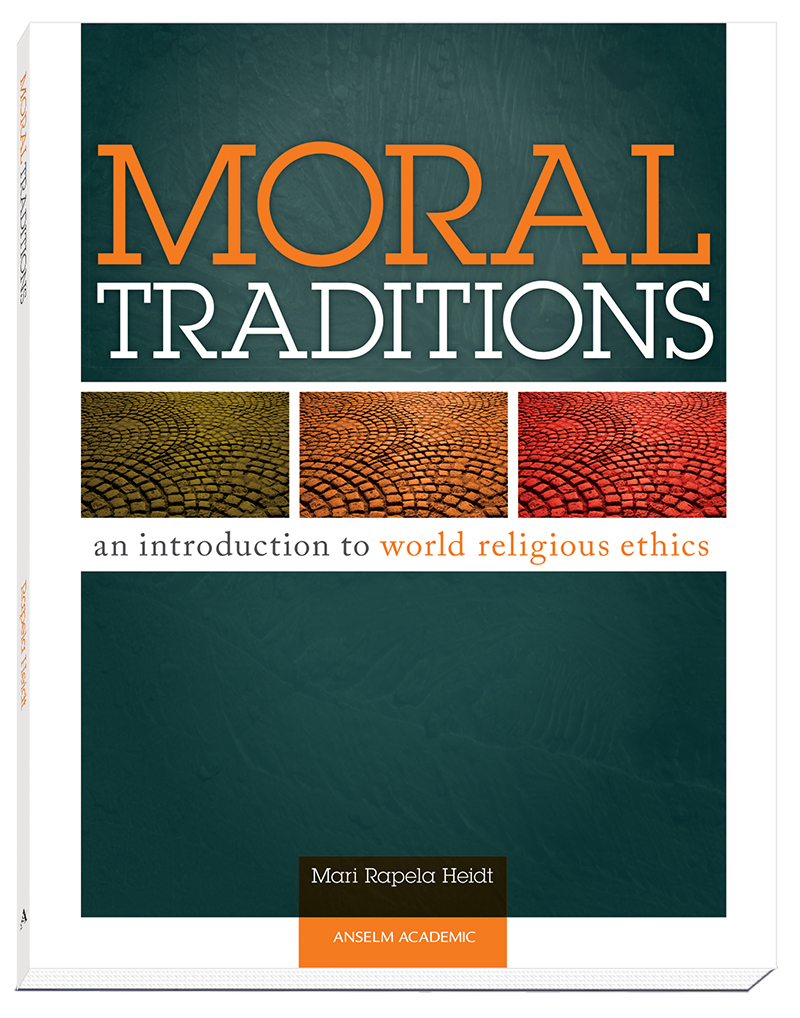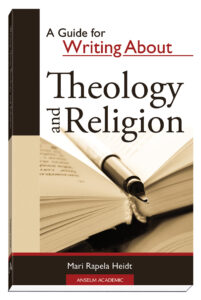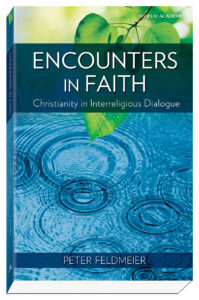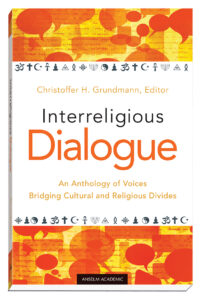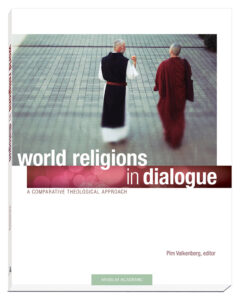Moral Traditions
An Introduction to World Religious Ethics
About This Book
Overview
Designed for College Students Learning Ethics and Religious Studies
This introductory textbook written by Mari Rapela Heidt on world religious ethics examines the moral traditions of the world’s great religions. Students will see how the various major religions are practiced today, how religion shapes modern human behavior, and how each religious tradition considered is at work in the world today.
The six major religious traditions discussed in this book are:
• Hindu
• Buddhist
• Jewish
• Christian
• Islam
• Chinese
Also discussed are:
• Sikhism
• Jainism
• Bahá’í
• Shinto
Each of the six chapters on the major traditions serves as a short refresher course in the tradition, covering the history and general beliefs of the tradition, the tradition’s approach to ethics and morality, what is sacred to each tradition, and how each communicates moral beliefs, principles, and practices. Each chapter concludes with discussion questions and suggestions for further study.
Details
| Weight | 0.6 lbs |
|---|---|
| Dimensions | 7.25 × 1.5 × 9.125 in |
| Format | Softcover |
| Print ISBN | 978-0-88489-749-1 |
| Pages | 148 |
| Item # | 7029 |
|---|
Customer Reviews
“Moral Traditions is an excellent resource for introducing students to the moral teachings of the world’s great religions. Today, as our world becomes ever more globalized, we are confronted with a diversity of religious belief and practice, a reality that has profound implications for how we, as a world community, address pressing ethical challenges. Mari Rapela Heidt provides a starting point to begin addressing this reality. By offering a brief introduction to the history of various religious traditions, a description of their basic moral teachings, and applications of these teachings to present-day realities, Heidt seeks to overcome the ignorance and misunderstanding that all too often characterize religious pluralism. She demonstrates both the commonalities and the differences in the moral teachings of these faith traditions, and provides students with clear, accessible explanations of how these traditions influence the moral behavior of their followers.”
College of Mount St. Joseph, Cincinnati, OH
“Moral Traditions is a first-class introduction to the many and varied ethical perspectives associated with the world’s major religions. Sensitive, pertinent, and focused, this volume offers clear and manageable descriptions of the moral dimensions of the traditions it surveys while inviting further investigation and dialogue. Mari Rapela Heidt resists the temptation to build overarching systems and allows each ethical perspective to speak on its own terms.”
University of Mary, Bismarck, ND
“Mari Rapela Heidt has produced an invaluable introductory religious ethics text for the millennial generation of students. In language that is relevant to this newest generation of students, a generation marked by the economic and cultural effects of globalization, Rapela Heidt provides a multiple-method approach to understanding the many world religions, and lived examples of a contemporary ethical issue addressed by each tradition. It will be a useful tool in introducing students to the complex world of religious ethics in the contemporary era.”
Florida International University, Miami
“Those of us who teach in undergraduate contexts that stress the importance of understanding not just the basics of ethical reasoning, but also the various shades of meaning ethics can have in the world’s major religions, know how difficult it is to find appropriate resources. Mari Rapela Heidt does an outstanding job of introducing novice ethicists to the field of comparative religious ethics through a concise and practical overview of the moral worlds of Hinduism, Buddhism, Judaism, Christianity, Islam, Daoism, Confucianism, Sikhism, Jainism, Bah’ai and Shinto. This book is sure to find its place as a text in a number of my religious ethics courses.”
“With Moral Traditions, I can maintain a consistent and well-informed outlook for students that will allow them to engage practical, ethical concerns that will resonate with their own concerns and choices in a way that abstract issues simply won’t. That is, my students are at that crucial age where they are forming their own character and moral outlook (as opposed to simply following their parents’ or their tradition’s). This book will allow them to cogitate and ruminate on how the religions we’re studying provide resources for thought and action on important and often controversial issues.”
Table of Contents
Preface
Introduction
What Studying Ethics Requires
- Ethics, Morality, and the Study of Religious Ethics
Ethics and Morality
Categories of Ethical Systems
Comparative Methods
Descriptive Methods
Conceptual Methods - Ethics in the Hindu Tradition
A Brief Review of the Hindu Tradition
The Moral World of Hinduism
Hindu Values and Principles
Moral Perspectives: Abortion and the Hindu Tradition - Ethics in the Buddhist Tradition
A Brief Review of the Buddhist Tradition
The Moral World of Buddhism
Buddhist Values and Principles
Moral Perspectives: Wealth, Poverty, and the Buddhist Tradition - Ethics in the Jewish Tradition
A Brief Review of the Jewish Tradition
The Jewish Moral Universe
Jewish Values and Principles
Moral Perspectives: Judaism and the Environment - Ethics in the Christian Tradition
A Brief Review of the Christian Tradition
The Christian Moral Universe
Jewish Values and Principles
Christian Values and Principles
Moral Perspectives: War, Peace, and the Christian Tradition - Ethics in the Islamic Moral Tradition
A Brief Review of the Islamic Tradition
The Moral World of Islam
Islamic Values and Principles
Moral Perspectives: Men, Women, and Islam - Ethics in the Chinese Moral Tradition
Chinese Traditional Religion
Daoism
The Confucian Tradition
The Chinese Moral Universe
Virtues to Live By
Moral Perspectives: China’s One-Child Policy - Additional Moral Traditions
Sikhism
Jainism
Bahá’í
Shinto
Glossary
Selected Bibliography
Index
Professional Reviews
“Mari Rapela Heidt has produced a very workable textbook for students of ethics in a number of the world’s religious traditions. Beneath the usefulness of the textbook, she is making a claim for the application of comparative ethics as a methodology for studying moral action across these traditions. Her comparative ethics appears to concern itself primarily with social ethics vice [sic] personal ethics. The definition of morality that drives the text is very broad in nature. She claims that it is about human actions toward others (ix). There is less space given to categorizing the content or intent of the actions. Instead of offering various standards for moral judgment, she presents a variety of perspectives of worldview and shows how general behavior in the relevant society is influenced by the perspective.
“Chapter one on ‘Ethics, Morality, and the Study of Religious Ethics’ is laid out more to satisfy other academics than it is to inform students. From a scholar’s perspective this is the most profitable portion of the book. The rest of the text is more sympathetic to the teaching endeavor. Heidt’s selection of ethics categories including deontology, consequentialism, virtue ethics, and divine command ethics, although admittedly not exhaustive, would allow for a practical exploration of morality across cultural and religious borders. However, there is little specific mention of [these categories] beyond the first chapter even though it is often apparent which approach is being considered at points later in the text. One reason for downplaying these categories is her appropriate decision not to force a religion into a fixed classification. Since she shapes such concise and manageable descriptions of each ethics category there is some frustration that they do not play a more overt role in the rest of the book.
“Moving into a consideration of the specific traditions, she judiciously crafts her chapter lengths to be substantial in content without being overwhelming to the average college or upper-level high school student. She bravely faces the challenge of summarizing the disparate facets of belief and practice in these religions. Although she acknowledges the vast variety, she might have given some indication of how practitioners at the extremes differ from the most popular efforts. A technique she uses to translate religion into ethics is to reorient practices and beliefs in terms of responsibilities and obligations. After a general review of the tradition, she looks at the moral world of the particular religion by pointing out features that bear moral implications or influence ethical perspectives.
“Each chapter also contains a synopsis of the values and principles at play in the religion. The final section raises a contemporary moral issue and describes how ethical theory and moral practice might influence the individual’s response. These [moral issues] include abortion, wealth and poverty, environment, war and peace, gender roles, and the one-child policy. Each issue is handled in a very balanced fashion, avoiding an application of a normative perspective that would be foreign to the tradition.
“She is also generally more positivistic, not dwelling solely on moral deficiencies. Perhaps the one element missing in Heidt’s work is actual comparison. She provides all the elements necessary to develop a good comparative case study, but not the comparisons themselves. This limitation is actually a plus, since the classroom instructor is left with this as a lively and fulfilling task. I would recommend using Heidt’s book as a textbook for a class in World Religious Ethics or simply as a supplement to add an ethical component to a World Religions class. I look forward to incorporating it into one of my own courses.”
